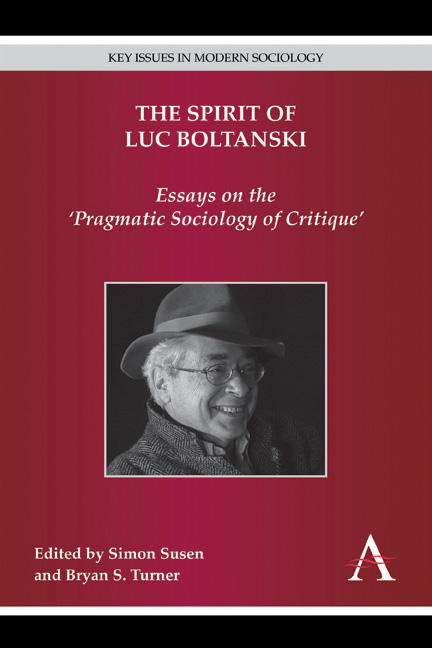Book contents
- Frontmatter
- CONTENTS
- List of Contributors
- Preface
- Part I Introductory Remarks
- Part II Luc Boltanski and (Post-) Classical Sociology
- Part III Luc Boltanski and Pragmatism
- Part IV Luc Boltanski and Critique
- Part V Luc Boltanski and Critical Sociology
- 9 Pierre Bourdieu and the Early Luc Boltanski (1960–1975): Collective Ethos and Individual Difference
- 10 Beyond Pragmatic Sociology: A Theoretical Compromise between ‘Critical Sociology’ and the ‘Pragmatic Sociology of Critique’
- 11 Towards a Dialogue between Pierre Bourdieu's ‘Critical Sociology’ and Luc Boltanski's ‘Pragmatic Sociology of Critique’
- Part VI Luc Boltanski and Political Sociology
- Part VII Luc Boltanski and Contemporary Issues
- Part VIII Luc Boltanski in Conversation
- Part IX Luc Boltanski and His Critics
- Index of Names
- Index of Subjects
9 - Pierre Bourdieu and the Early Luc Boltanski (1960–1975): Collective Ethos and Individual Difference
from Part V - Luc Boltanski and Critical Sociology
Published online by Cambridge University Press: 05 December 2014
- Frontmatter
- CONTENTS
- List of Contributors
- Preface
- Part I Introductory Remarks
- Part II Luc Boltanski and (Post-) Classical Sociology
- Part III Luc Boltanski and Pragmatism
- Part IV Luc Boltanski and Critique
- Part V Luc Boltanski and Critical Sociology
- 9 Pierre Bourdieu and the Early Luc Boltanski (1960–1975): Collective Ethos and Individual Difference
- 10 Beyond Pragmatic Sociology: A Theoretical Compromise between ‘Critical Sociology’ and the ‘Pragmatic Sociology of Critique’
- 11 Towards a Dialogue between Pierre Bourdieu's ‘Critical Sociology’ and Luc Boltanski's ‘Pragmatic Sociology of Critique’
- Part VI Luc Boltanski and Political Sociology
- Part VII Luc Boltanski and Contemporary Issues
- Part VIII Luc Boltanski in Conversation
- Part IX Luc Boltanski and His Critics
- Index of Names
- Index of Subjects
Summary
Introduction
In his Foreword to Richard Nice's translation into English of Bourdieu and Passeron's La Reproduction as Reproduction in Education, Society and Culture (Bourdieu and Passeron, 1977 [1970]), Tom Bottomore noted that the book expounded ‘the theoretical ideas which have guided the research on cultural reproduction over the past decade or so’ (Bourdieu and Passeron, 1977 [1970]: v) of the Centre de Sociologie Européenne (CSE) in Paris. He recognized that the book was the product of the collective activity of a group of researchers and that it demonstrated ‘the continuous interplay between theory and research’ (Bourdieu and Passeron, 1977 [1970]: v) as well as the overcoming of the division between ‘thinkers’ and ‘researchers’, which – in the view of some – was ‘a major failing of sociology as a science’ (Bourdieu and Passeron, 1977 [1970]: v). He considered that it may well be that this division could be transcended effectively, not by the ‘intermittent launching even of large-scale research projects’ (Bourdieu and Passeron, 1977 [1970]: vi) but, as he commented somewhat enviously,
by this kind of long-term involvement in the exploration of a particular broad domain of social life, by a group of researchers who acquire to some extent the qualities of a ‘school’ of thought.
(Bourdieu and Passeron, 1977 [1970]: v–vi)For Bottomore, the secret of the success of the CSE as a ‘school’ lay in its concentration over a sustained period of time on clearly demarcated objects of analysis – those associated with education and culture. There are, however, alternative explanations, both of which emphasize, instead, the a priori affective or cognitive dispositions of the group, generating its particular categories of research objects. Leaving aside the undoubted ‘charisma’ of Bourdieu, the Weberian connotations of which Bourdieu would have been anxious to disown, there is the possibility that there existed an elective affinity between the members of the group and that its intellectual identity was collectively constructed.
- Type
- Chapter
- Information
- The Spirit of Luc BoltanskiEssays on the 'Pragmatic Sociology of Critique', pp. 265 - 292Publisher: Anthem PressPrint publication year: 2014



